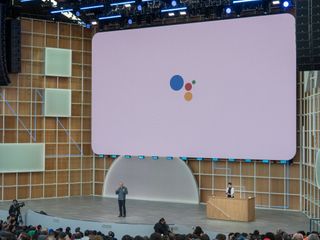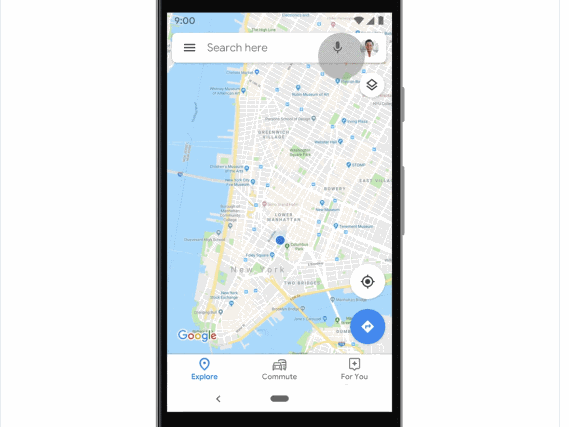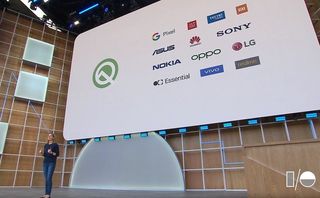After years of criticism, Google is finally getting serious about protecting our data

Our first look at the Android Q beta was enough to see that privacy was going to be a focus during the annual Google I/O developer conference. Now that we've seen much of what the company has planned for the near future, it's evident that Google intends to go all-in when it comes helping us protect our data even when it's outside of a secure Google data facility.
Google CEO Sundar Pichai made it clear during the opening keynote: "We clearly believe that privacy and security are for everyone, not just a few." It's always been a goal for Google to keep your user data private when possible and anonymous when it isn't, but recent events and the ever-present threats of being always connected mean that it's more important now than ever to give users those options. Thankfully, Google has stepped up to the plate, with eyes on the back fence.
Company focus on privacy
Some of the changes announced are going to be universal across your entire Google account and data portfolio. A good example is the forthcoming option to automatically delete your location, web, and application activity history every three months.
Some features simply need more exposure on their privacy settings, while others need a mulligan.
Google tells you that this sort of activity is going to be kept when you first start using one of its services, giving you a simple way to delete the history with the click of a button, but it's been criticized for making these settings difficult to find. And terms like "timeline" or location history don't have a clear meaning to everyone; it quickly became evident that more control was needed. Google is adding it for everyone in the near future and plans to add other account data to the auto-delete feature over the coming months and years.

In tandem with new data retention policies, Google is bringing its Incognito mode to more services. Incognito Mode is often misunderstood when it comes to privacy, but it's actually easy to figure out: it keeps anything you do while using it from being stored in your Google account; your activity isn't associated with you. Incognito Mode for Chrome means Google isn't keeping track of your searches or websites you visit. When Incognito mode comes to the Maps and Search apps, expect the same.
Goodbye Nest, Hello Nest.
Another sweeping example is the re-absorption of Nest. It's still going to be a standalone brand (though its name is now officially Google Nest), but it's going to be part of the larger Google Hardware division with its new Commitment to Privacy in the Home strategy. The full guide is available online and covers connected home devices and services that use Google Accounts and carry the Google Nest, Google Home, Nest, Google Wifi or Chromecast brand. Google will take time to better explain what these smart devices are actually monitoring and how they do it, consolidating everything under a single account with clear and concise rules about how your data is used and provide a dedicated team to help make sure you understand it all. Plus, Nest camera products will make it absolutely clear when they're recording; Google plans to remove the option to disable the LED while the camera is in use.
Quality

The biggest improvements to privacy control, though, are slated to be part of the Android Q release. Besides changes like better control over your location data or keeping developers from knowing who you contact the most, at I/O we learned that Google's next version of its AI engine can now live on the phone and not in the cloud. Part of what can make that possible is that Google is getting better at doing it — Google Assistant on the next generation of Pixel phones will be faster and able to handle more complex tasks inside an engine that requires half the storage space as the previous version.
Be an expert in 5 minutes
Get the latest news from Android Central, your trusted companion in the world of Android
Android Q is a new take on how your data is handled while it's still on your phone.
Hardware has become significantly better in recent generations, too, and the chip inside a phone like the upcoming Pixel 4 will be able to handle the processing Assistant needs to be done in real time without uploading it to any cloud service. This will not only allow for incredibly helpful assistive tech like real-time audio and video transcription but it will also keep everything local so no other company — including Google itself — has access to critical data like your voiceprint or facial map. We're already seeing an offshoot of this idea in Gboard, Google's excellent keyboard, where what Google calls "federated learning" is helping to improve word and emoji prediction. The things you type are private, but data that improves the algorithm is sent back to Google.
If this sounds familiar, that's because it's how Apple handles data for services like Face ID and Siri. Advancements in Apple's custom processor made it possible to compute these sorts of heavy loads several years before silicon from companies like Qualcomm offered it, so most of the things Siri could do were done on the phone and stayed private. The big difference here is that Assistant can also be useful if you want to send data to Google and control smart devices or tap into your online account.
Do less evil

I've always trusted that Google would take good care of my private data. The company collects an enormous amount of it and every bit and byte is used to further Google's business. When a company relies on something as a way to make money, it tends to treat it well.
I wanted to see a bigger focus on privacy and that's exactly what was delivered.
I've also always wanted some of my data to stay in my own hands. Virtual Assistants and smart devices do make life convenient and offer a service worth their price in data, but as we move forward and AI gets "smarter" there are some things that it simply doesn't need to store. Seeing a new engine that lives on the device yet can still use facial and voice recognition to be better than the last version is great. It's a step closer to the future a younger me envisioned when I was reading those dusty sci-fi books under the covers at night.
More importantly, it's just good to see a company realize that things need to change, then get its hands dirty and change them. Google could go forward without any of these changes and still be wildly successful; we see it in action with Facebook, which hems and haws its way through scandal after scandal without investing in meaningful, systemic improvements to prevent them from happening again.
Recently I was considering saying goodbye to Android and moving everything into the Apple camp, solely because I liked its focus on privacy. Changes like the ones announced at I/O 2019 mean I don't have to as long as Google follows through. I'm betting it will.
Top 10 announcements from Google I/O 2019!
Have you listened to this week's Android Central Podcast?

Every week, the Android Central Podcast brings you the latest tech news, analysis and hot takes, with familiar co-hosts and special guests.

Jerry is an amateur woodworker and struggling shade tree mechanic. There's nothing he can't take apart, but many things he can't reassemble. You'll find him writing and speaking his loud opinion on Android Central and occasionally on Twitter.
